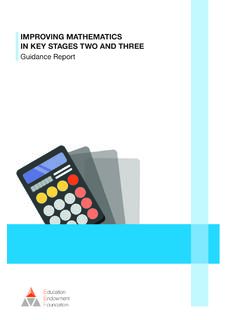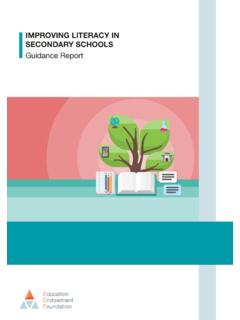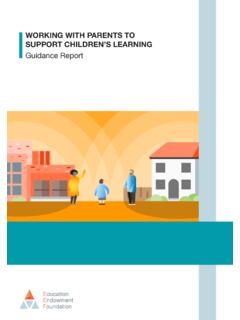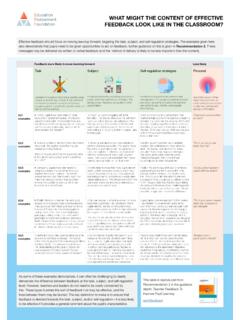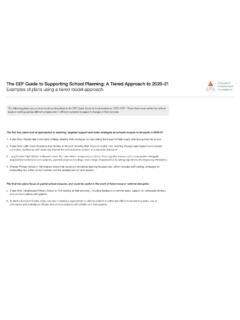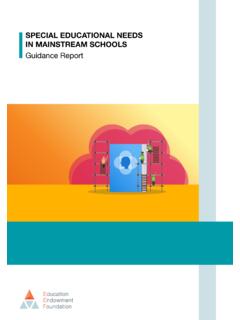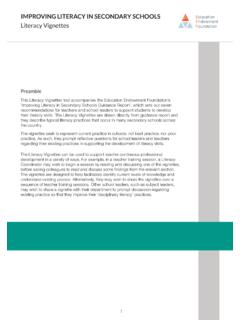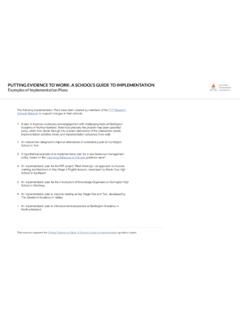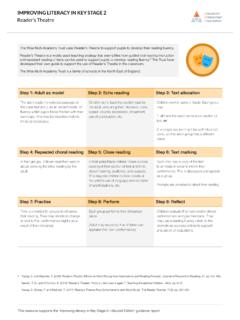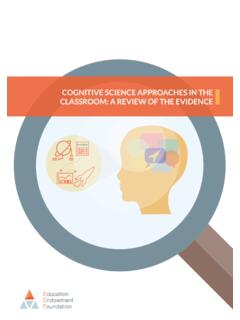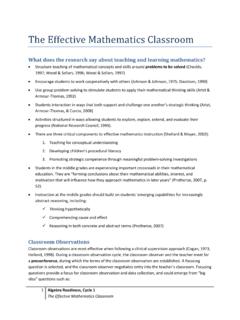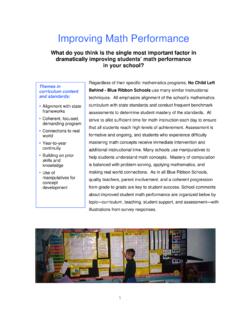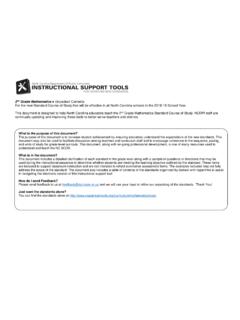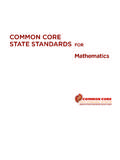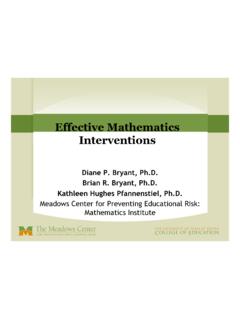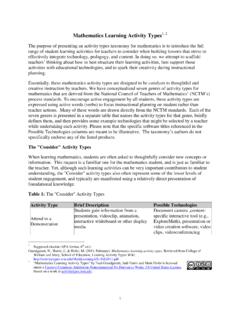Transcription of Improving Mathematics in Key Stages Two and Three ...
1 Education Endowment FoundationImproving Mathematics in Key Stages Two and Three Recommendations Summary1 Use assessment to build on pupils existing knowledge and understanding Assessment should be used not only to track pupils learning but also to provide teachers with information about what pupils do and do not know This should inform the planning of future lessons and the focus of targeted support Effective feedback will be an important element of teachers response to assessment Feedback should be specific and clear, encourage and support further effort, and be given sparingly. Teachers not only have to address misconceptions but also understand why pupils may persist with errors Knowledge of common misconceptions can be invaluable in planning lessons to address errors before they arise 4 Enable pupils to develop a rich network of mathematical knowledge Emphasise the many connections between mathematical facts, procedures.
2 And concepts Ensure that pupils develop fluent recall of facts teach pupils to understand procedures teach pupils to consciously choose between mathematical strategies Build on pupils informal understanding of sharing and proportionality to introduce procedures teach pupils that fractions and decimals extend the number system beyond whole numbers teach pupils to recognise and use mathematical structure5 Develop pupils independence and motivation Encourage pupils to take responsibility for, and play an active role in, their own learning This requires pupils to develop metacognition the ability to independently plan, monitor and evaluate their thinking and learning Initially, teachers may have to model metacognition by describing their own thinking Provide regular opportunities for pupils to develop metacognition by encouraging them to explain their thinking to themselves and others Avoid doing too much too early Positive attitudes are important, but there is scant evidence on the most effective ways to foster them School leaders should ensure that all staff, including non-teaching staff.
3 Encourage enjoyment in maths for all children6 Use tasks and resources to challenge and support pupils Mathematics Tasks and resources are just tools they will not be effective if they are used inappropriately by the teacher Use assessment of pupils strengths and weaknesses to inform your choice of task Use tasks to address pupil misconceptions Provide examples and non-examples of concepts Use stories and problems to help pupils understand Mathematics Use tasks to build conceptual knowledge in tandem with procedural knowledge Technology is not a silver bullet it has to be used judiciously and less costly resources may be just as effective7 Use structured interventions to provide additional support Selection should be guided by pupil assessment Interventions should start early, be evidence-based and be carefully planned Interventions should include explicit and systematic instruction Even the best-designed intervention will not work if implementation is poor Support pupils to understand how interventions are connected to whole-class instruction Interventions should motivate pupils not bore them or cause them to be anxious If interventions cause pupils to miss activities they enjoy, or content they need to learn, teachers should ask if the interventions are really necessary Avoid intervention fatigue.
4 Interventions do not always need to be time-consuming or intensive to be effective 8 Support pupils to make a successful transition between primary and secondary school There is a large dip in mathematical attainment and attitudes towards maths as children move from primary to secondary school Primary and secondary schools should develop shared understandings of curriculum, teaching and learning When pupils arrive in Year 7, quickly attain a good understanding of their strengths and weaknesses Structured intervention support may be required for Year 7 pupils who are struggling to make progress Carefully consider how pupils are allocated to maths classes Setting is likely to lead to a widening of the attainment gap between disadvantaged pupils and their peers, because the former are more likely to be assigned to lower groups2 Use manipulatives and representations manipulatives (physical objects used to teach maths) and representations (such as number lines and graphs) can help pupils engage with mathematical ideas However, manipulatives and representations are just tools.
5 How they are used is essential They need to be used purposefully and appropriately to have an impact There must be a clear rationale for using a particular manipulative or representation to teach a specific mathematical concept manipulatives should be temporary; they should act as a scaffold that can be removed once independence is achieved3 teach pupils strategies for solving problems If pupils lack a well-rehearsed and readily available method to solve a problem they need to draw on problem-solving strategies to make sense of the unfamiliar situation Select problem-solving tasks for which pupils do not have ready-made solutions teach them to use and compare different approaches Show them how to interrogate and use their existing knowledge to solve problems Use worked examples to enable them to analyse the use of different strategies Require pupils to monitor, reflect on, and communicate their problem solving
